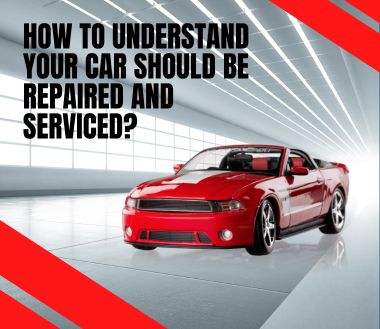You can identify problems with your vehicle before they worsen with the assistance of a reliable mechanic. Early detection of issues may help you prevent future costly repair costs. Regular maintenance will extend the lifespan of your vehicle over time. When you keep the integral parts running in their top condition, then your car becomes roadworthy for the long term even after the warranty has ended. In the near term, routine maintenance may help you maintain your car's long-term resale value. For a vehicle that has been maintained well, buyers are typically ready to pay more, and regular maintenance could make all the difference.
The 7 Warning Signals For Car Repairs
Watch out for these symptoms in between trips to your nearby car service centre or contacting a mobile mechanic, to know when the car repairs and servicing are needed for a smooth drive in Lilydale –
1. Dashboard Indication Lights
The dashboard warning light is the best way to indicate that your vehicle needs maintenance. Also quite literally, as most contemporary cars' instrument panels display the word "SERVICE" or a spanner icon before your car is due for an inspection.
The light frequently comes with a text that informs you of the remaining distance or number of days until you should take your vehicle to a garage. Some versions even let you know when a service is past due.
The service reminder light can come on due to a particular fault in addition to appearing during routine inspections. To help you identify the issue, you might see that the light turns on concurrently with another sign on your dashboard.
2. Unusual Sounds
Clicks hisses, twitches, and squeaks could all be symptoms of an issue with the engine. As soon as it's safe to do so, pull over and make a mechanic contact if the noise is getting louder or the issue seems urgent.
You should listen out for the following less pressing noises:
• When the noises happen (such as when rotating or when at rest);
• What they sound like (such as rattling or clicking);
• Where they originate. (e.g. under the bonnet, under the car)
Your car repairs technician will be able to identify the issue if you can describe "when," "what," and "where" the issue occurred. When your vehicle is idle, if you hear hissing coming from under the hood, your engine may be overheating, which can be a serious issue. But that's just one instance of what strange noises in your vehicle might indicate.
3. Liquid Drips And Unidentified Pools
First things first, you should make sure the puddle has developed and not that there is a problem with your car. In the summer, condensation in the air conditioning unit or your exhaust in the winter can cause water leaks in your vehicle. In either case, neither situation is dangerous and won't require a mechanic's help.
If the coloured liquid is dripping from your vehicle, you may be dealing with a more serious issue.
Brown liquid could indicate the loss of brake fluid, power steering fluid, or oil, which is the most dangerous of all. If you think you might be low on a necessary fluid, you shouldn't even try to drive your vehicle to the shop. Attempt to schedule a call from a certified mechanic instead.
4. Power Loss And Repeated Stopping
Regular maintenance could stop your vehicle from struggling to start or from stalling more frequently.
Your car's issues could be caused by a variety of factors, and in some cases, a straightforward repair is available. The spark plugs in your vehicle may be defective. Thankfully, changing them is a simple and affordable task, but it's best to leave it to the experts.
Alternatively, your motor could be running on little to no fuel or oxygen due to a malfunctioning fuel injection system. Airflow problems could also be caused by a clogged catalytic converter; a quick repair will help identify the issue.
5. Various Brake Behaviours
The most crucial safety element on your car is likely its brakes. Your car may start to lose efficiency if you don't have it serviced.
To apply to stop the force, you might need to press harder on the brake pedal, and this is typically due to one of two things:
• Brake fluid leaks
• Scuffed brake pads
During a repair, a mechanic will be able to identify the issue, and changing brake pads is typically a straightforward procedure. Check your area for mobile mechanics because it's best to contact a professional out to your car for repairs rather than take the chance that your brakes will fail as you drive to a garage.
6. Smoke Emanating From The Tailpipe Or Hood
There are numerous reasons why smoke can escape from vehicle exhausts and bonnets.
Turn off your engine, and pull the bonnet release lever, but don't try to prop it open, get everyone out of the car, stay back, call the fire department at 999, and, if it's safe to do so, warn oncoming traffic. If the smoke appears to be coming from a fire under your bonnet.
When the smoke first emerges (for example, when starting the engine or accelerating), you should pay close attention to:
• the colour of the smoke
• the source, such as under the hood or from the exhaust;
• whether your vehicle is overheating
This information will enable the mechanic to identify the issue with your car more rapidly. Your head gasket, cooler systems, electrical cables, pistons, and fuel valves could all have issues.
7. Rumbling
Regular maintenance could also stop your vehicle from juddering or vibrating.
There are several possible reasons why your vehicle might be moving unusually. For instance, juddering while drawing away may be caused by worn-out friction material or a defect in the pressure plate, or possibly both. Another possibility is that the clutch plate was contaminated by an oil spill. Low revs may cause your car to judder or vibrate if the engine mount holding the engine in position is loose, worn out, or damaged.
A car mechanic will inspect every aspect of your vehicle during service, including the fluid levels in the engine and general wear and tear. Consider it as a vehicle health check that enables it to operate as securely and effectively as possible. Your vehicle will operate as efficiently as possible thanks to routine inspections. Without them, you might have to pay more for gas and other operating expenses. For instance, you might need to fill your tank more frequently if your tyres are ignored and go flat.






